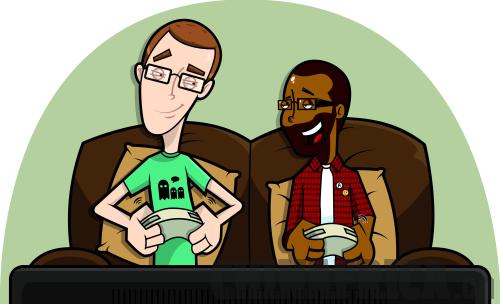| 
Statistics published earlier this year in the book Reality Is Broken: Why Games Make Us Better and How They Can Change the World show that people around the globe spend in total 3 billion hours a week playing video or online games. While the book's author, Jane McGonigal, posits that gaming can be a productive and inspirational activity, she acknowledges this may not always be the case. Video and online games can also be time wasters – and in worst case scenarios, addiction may become an issue.Wanjau Wairimu, a Kenyan graduate student at the Tsinghua School of Journalism and Communication in Beijing, and Ma Shukun, a reporter and editor with Xinhua News Agency, give their own take on playtime in the 21st century.
Gamers' Loss
by Wanjau Wairimu
When I first took the subway in Beijing, I was a little bit awestruck by the quiet: everyone was busy tapping away on handheld devices. A couple seated in front of me were on their phones playing games. They rarely spoke to each other. I only realized they were together when the woman placed a kiss on the man's cheek.
I neither play online games nor download game apps on to my phone. I don't even play games on my computer. I find gaming very impersonal and am more inclined to play old fashioned board games and cards; I like human interaction.
I use my computer eight hours a day for studying and work. During this time I don't interact that much with people – 90 minutes at most – maybe a quick question here and there or during lunch, and then it's back to the screen.
I get my human contact during weekends, playing board games with friends. We played Monopoly recently, and my friends kept tossing jibes at one another – antics that come only with the losing and gaining of money.
Video and online games might try to mimic the human emotions but it's not the same. I have seen people playing on an Xbox, Wii and Playstation and there's no direct human contact: everyone is facing a screen.
I find that playing video or online games to hamper social skills development. Facing of one another around a table during a card game, for example, helps improve nonverbal communication, an ability that differs from person to person.
Ranging from body language like gestures and posture to facial expressions, the learning of nonverbal cues is crucial. One study conducted at the University of California, Los Angeles found that up to 93 percent of nonverbal communication was needed for people to communicate effectively.
Video or online games may have humanistic features like laughter, but it's the same type of laughter over and over. Laughter as a form of nonverbal communication rings in various decibels, which can signal a person's true emotion. Differences in pitch can help to identify if somebody is either frustrated or happy.
I don't understand why people would want to substitute human contact with an automated voice and virtual features in an already-computerized world. All relationships require communication, and learning how to understand nonverbal communication cues is not something video or online games can teach.
Games and Goals
by Ma Shukun
I finally managed to stop playing my favorite game – Bejeweled, a gem swapping puzzler – after topping my previous scores. I had stared at the computer for more than an hour, my eyes felt burned and sour. I forgot whether I had blinked amid such intense concentration.
Having worked 12-hour days for seven consecutive days, I had decided to reward myself by indulging in the puzzler, which had replaced Plants vs. Zombies as my current favorite.
I constantly told myself that one hour of play was the limit. But, consumed with craving to beat my highest score, I forgot how many rounds I had played. Time flew. No matter how many times part of me insisted on clicking "Exit," my emotions always yielded to the urge to surpass my last score.
I suddenly realized the spell the game had cast upon me: I was addicted. I worried about losing myself.
My gaming life started shortly after I began living on my own after graduating from university. I had to do something to fill the void of time passing. Video games came to my rescue.
I used to have contempt for game-maniacs who spend days and nights playing video games instead of doing meaningful things. Now walking a fine line of my own, a slight loss of self-control would push me over the edge to becoming one of them.
However, I am not a big fan of online or web games, which, I think, seem to have no end other than endless upgrading of so-called equipment. I am more a goal-pursuer. That's why I prefer puzzle games in which I can see the end. They build up my confidence, and offset frustrations I face in my career and life.
Living in Beijing, I am prone to temptation and distraction; fierce competition pushes me to step up for fear of being left behind. Games provide a tranquil harbor where I can hide from the hustle and bustle and mounting pressure.
At least playing games is conducive to increasing my English vocabulary, a benefit that never occurred to me when I scorned gamers. Through playing Hidden Objects, I've built up a very useful vocabulary like moth, hammer, screw and others – much more interesting than the English I learned in school.
I love games, but am trying to cut down my playing time. After all, life is not a game. I have more serious things I need to do. |